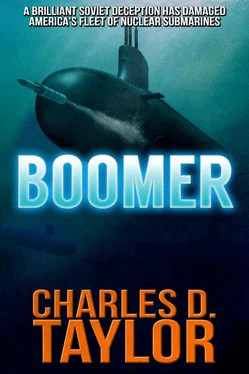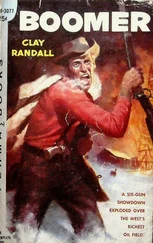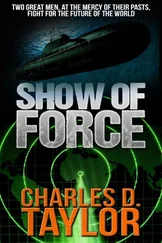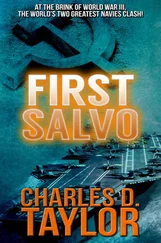Nelson pulled the headphones over his ears and listened. He heard the rush of nothingness, the sound of the living Pacific Ocean, indistinct yet existing beyond their hull. But there was nothing else other than Florida’ s own minimal noise signature as it slipped through the water, not even when Chief Delaney wagged an index finger at him and then pointed at one of his ears with his eyebrows raised. There was something there — Nelson was willing to acknowledge their abilities to discern what was nonexistent to the normal ear — but, no, nothing he could identify. He handed the headphones back to Mundy.
“See what I mean. Captain.” The XO nodded. “They’re all crazy.”
“Look at Delaney. He acts like he’s listening to the Boston Pops.”
Cross nodded sagely. “Like the sound of one hand clapping. What would we do without them?” It was easy to joke about it, even easier to dismiss if each of them didn’t realize that this indistinct, unidentifiable sound that had just traveled through untold miles of saltwater could be an enemy. There was no reason for it to exist in this section of the Pacific. And Delaney was sure it was another submarine!
The chief spoke to Nelson without looking in his direction. “Captain, we’re going to clarify that and amplify it before feeding it into the computer and then … oh, shit!” He lifted the headset off and draped it around his neck again. “There it goes. But I think we got enough.”
Nelson noted that his sonar officer was still listening, a troubled expression on his face. “Chief,” Nelson said, “the XO and I are going to wake up with a cup of coffee in the wardroom. Why don’t you and Mr. Mundy come on up there when you’ve decided why no one wants us to sleep.” As they left the sonar room, he added over his shoulder, “If you come up with something we can have fun with, you might even get a doughnut out of the deal.”
“Give us fifteen or twenty minutes, sir.”
Less than fifteen minutes later Dan Mundy came into the wardroom with the chief. “Delaney was right the first time, Captain,” he said as he poured two mugs of coffee. “Manmade … and subsurface.”
Each man looked at the other silently, seemingly embarrassed that there was nothing definitive any of them could say.
“Whose?” Nelson inquired softly.
Delaney looked apologetic as he reached for a doughnut. “Can’t tell yet. Too far away, I’d say. We’ve been experiencing some odd temperature gradients out there for one thing, and I don’t think our contact is burning up the ocean either. That’s why whatever we pick up keeps drifting in and out. We’ve got to have a steadier sound for a while before we can analyze it properly. Or we’ve got to find some spot out here where water temperatures are constant and he lights up for us like a neon sign.”
“I suppose we’re going to have to wait to get any target-motion analysis.” Jimmy Cross spread his hands on the table, palms up.
“All we can be sure of is that it’s off the port bow now,” Mundy responded. “Could be doing anything.”
Nelson ran the back of his hand across the stubble on his chin. “And we’ve got nothing of ours operating nearby?” he asked the XO again.
“Not unless there’s been some drastic changes in op areas that they didn’t give us before we got under way,” Cross answered.
“Then it’s Soviet.” Buck Nelson shrugged and spread his hands. “No one else is running submarines out here.”
There was no response from any of the others.
“So, my friend,” Nelson said to Mundy. “No more sleep for you, I’m afraid.” He grinned at Delaney. “You see, there are ways of getting even, Chief. Until we know better, your contact is assumed to be unfriendly. I want you to do everything you possibly can — and then some — to identify it and track it. We’ll keep the rest of the crew on regular watch until we have something. We’re going to turn to a southerly leg shortly, and that’ll bring your contact to the starboard bow, maybe close it a bit.”
“Suggestion,” Cross said.
“Shoot.”
“I’d like to have the OOD’s exaggerate their base course maneuvering, try some more radical depth and course changes. If sound conditions are as difficult as the chief claims, we might as well cover ourselves as much as possible … make it equally difficult if they’re looking for us.”
“Go ahead, Mr. Sones has been looking forward to something to kill the boredom. That ought to make him happy.”
* * *
No more than a couple of weeks had been necessary for COMSUBPAC’s flag lieutenant to become comfortable around admirals. His job required that he work closely with one daily, and he had lost track of the number he had met since he was ordered to Neil Arrow. At first, totaling up the number of stars he came in contact with had been a game — one for a fresh-caught flag officer, two for a rear admiral, three for a vice admiral, and four for a full admiral. But he lost track when he passed one hundred thirty, so he decided to break off his count at the end of each week. He was also getting tired of all those stars. Admirals had become a dime a dozen.
It was quite different, though, when the CNO and the three most senior submariners in the Navy gathered in one room. The stars totaled fourteen, although it came to eighteen whenever PACFLEET joined them. That was the very highest end of the scale, if his averages included stars in a single room at one time. And not only were they an imposing group, these men were also family — on a first-name basis and well aware of each other’s strengths and weaknesses. One man’s thoughts could easily be verbalized by another.
“Right there,” Neil Arrow tapped the spot on the northern Pacific with a pointer. “Last-known position. They were closing on that Soviet intelligence vessel.”
“I thought they were scheduled for refueling,” said Admiral Larsen.
Arrow nodded. “They already had rendezvous instructions. The pilot rogered them — so he had to have received them properly — then he continued with something else that was garbled. Weather stinks up there. Must be three or four fronts trying to pass through all at the same time. Communications were limited at best.”
“But they’d found something out, your flag lieutenant said?” Larsen inquired.
“I’m not sure what. That’s the message, or whatever we could put together from it.” He nodded at the flag lieutenant. “Give Admiral Larsen a copy of that, please. You see, Ray,” he continued, “it just came to me about fifteen minutes ago, and it was so nebulous I couldn’t see dragging you out of the head to read it, since you were going to be in here in a few minutes anyway. All we can figure is that the pilot was closing that Soviet intelligence ship because he apparently thought he had something. He probably figured the weather was screwing everything up and it was worth a shot to come in on top of them.”
Mark Bennett’s eyes had never left the spot where the pointer had been. Christ, what a godforsaken place! South of the Aleutians — where elephants went to die. There wouldn’t be a trace of that plane by the time the weather cleared, and sometimes it was like that for weeks on end. “What a hell of a way to go. I hope they were dead before they hit the water.” He was aware of some of the grisly sights rescue craft found after men had struggled to survive in those waters. “They deserved better than they got.”
“We don’t know for certain—” Newman began.
“No, we don’t, Robbie. I guess that’s the least of our concerns, isn’t it? No backup for them?”
“Weather closed in worse than when we sent them out,” Arrow answered. “We were advised to wait a couple of hours to see if it would lighten up. It’s not going to.”
Читать дальше












